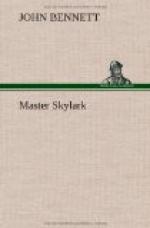Heywood flushed.
“Nay, Tom, don’t be nettled; ’tis not the fault of thy play. There’s naught will serve. We’ve tried old Marlowe and Robin Greene, Peele, Nash, and all the rest; but, what! they will not do—’tis Shakspere, Shakspere; our City flat-caps will ha’ nothing but Shakspere!”
Nick listened eagerly. Master Will Shakspere must indeed be somebody in London town! He stared across into the drifting cloud of mist and smoke which hid the city like a pall, and wondered how and where, in that terrible hive of more than a hundred thousand men, he could find one man.
“I tell thee, Tom Heywood, there’s some magic in the fellow, or my name’s not Henslowe!” cried the manager. “His very words bewitch one’s wits as nothing else can do. Why, I’ve tried them with ’Pierce Penniless,’ ‘Groat’s Worth of Wit,’ ‘Friar Bacon,’ ‘Orlando,’ and the ‘Battle of Alcazar.’ Why, tush! they will not even listen! And here I’ve put Martin Gosset into purple and gold, and Jemmy Donstall into a peach-colored gown laid down with silver-gilt, for ‘Volteger’; and what? Why, we play to empty stools; and the rascals owe me for those costumes yet—sixty shillings full! A murrain on Burbage and Will Shakspere too!—but I wish we had him back again. We’d make their old Blackfriars sick!” He shook his fist at a great gray pile of buildings that rose above the rest out of the fog by the landing-place beyond the river.
Nick stared. That the play-house of Master Shakspere and the Burbages? Will Shakspere playing there, just across the river? Oh, if Nick could only find him, he would not let the son of his wife’s own cousin be stolen away!
Nick looked around quickly.
The play-house stood a bowshot from the river, in the open fields. There was a moated manor-house near by, and beyond it a little stream with some men fishing. Between the play-house and the Thames were gardens and trees, and a thin fringe of buildings along the bank by the landings. It was not far, and there were places where one could get a boat every fifty yards or so at the Bankside.
But—“Come in, come in,” said Henslowe. “Growling never fed a dog; and we must be doing.”
“Go ahead, Nick,” said Carew, pushing him by the shoulder, and they all went in. The door opened on a flight of stairs leading to the lowest gallery at the right of the stage, where the orchestra sat. A man was tuning up a viol as they came in.
“I want you to hear this boy sing,” said Carew to Henslowe. “’Tis the best thing ye ever lent ear to.”
“Oh, this is the boy?” said the manager, staring at Nick. “Why, Alleyn told me he was a country gawk!”
“He lied, then,” said Carew, very shortly. “’Twas cheaper than the truth at my price. There, Nick, go look about the place—we have business.”
Nick went slowly along the gallery. His hands were beginning to tremble as he put them out touching the stools. Along the rail were ornamental columns which supported the upper galleries and looked like beautiful blue-veined white marble; but when he took hold of them to steady himself he found they were only painted wood.




